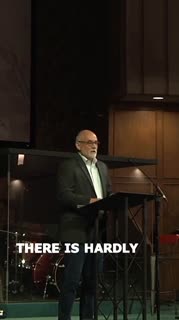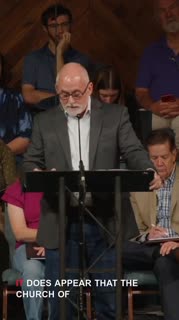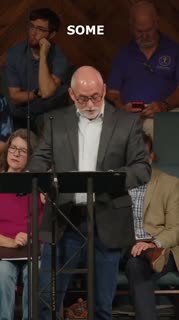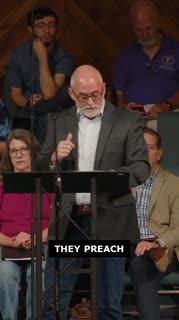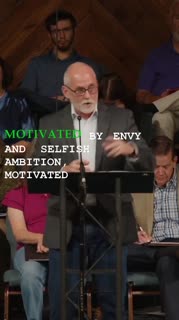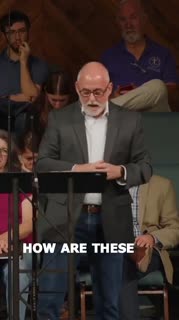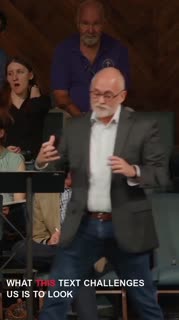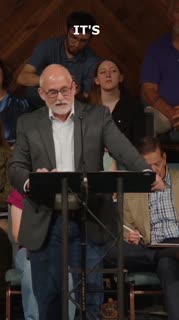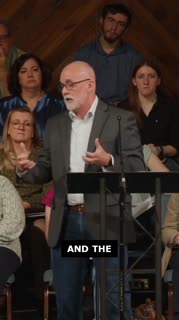Examining Motives: Proclaiming Christ with Purity
Summary
In today's reflection, we delve into the profound wisdom found in the book of James and the letter to the Philippians, exploring the themes of jealousy, selfish ambition, and the purity of proclaiming Christ. The passage from James reminds us that true wisdom is characterized by purity, peace, gentleness, and mercy, contrasting sharply with the disorder and vile practices that stem from jealousy and selfish ambition. This dichotomy is not just a historical issue but a present-day challenge within the church, as evidenced by the early church's struggles, particularly in Corinth, and even in the more stable Philippian church.
Paul's letter to the Philippians reveals a unique situation where some individuals preached Christ out of envy and rivalry, hoping to cause him distress during his imprisonment. Despite their impure motives, Paul rejoices because Christ is proclaimed. This paradoxical scenario challenges us to examine our own hearts and motivations. Are we proclaiming Christ out of genuine love and goodwill, or are there hidden motives of jealousy and selfish ambition lurking within us?
As we approach the Lord's Supper, we are invited to reflect deeply on our motivations. The act of proclaiming Christ through the Lord's Supper is a powerful declaration of faith, but it also serves as a mirror to our souls. We must ask ourselves whether we are part of the "most" who proclaim Christ sincerely or the "some" who do so with ulterior motives. The Scriptures warn us that wherever jealousy and selfish ambition exist, disorder and every vile practice will follow. Therefore, we must seek the Holy Spirit's guidance to reveal any hidden jealousy or selfish ambition within us, ensuring that our proclamation of Christ is pure and sincere.
Key Takeaways:
- The wisdom from above is characterized by purity, peace, gentleness, and mercy, contrasting with the disorder and vile practices that arise from jealousy and selfish ambition. This wisdom calls us to examine our hearts and align our actions with the virtues of true wisdom. [00:43]
- The early church faced many of the same issues we encounter today, including divisions, immorality, and doctrinal disputes. Recognizing these historical challenges helps us understand that the church's struggles are not new and encourages us to address them with humility and grace. [02:10]
- Paul's response to those preaching Christ out of envy and rivalry is a profound lesson in grace. Despite their impure motives, he rejoices in the proclamation of Christ, reminding us that God can use imperfect messengers to spread the gospel. This challenges us to focus on the message rather than the messenger. [06:18]
- The act of proclaiming Christ through the Lord's Supper is both a declaration of faith and a call to self-examination. We must ask ourselves whether we are proclaiming Christ sincerely or if hidden motives of jealousy and selfish ambition are influencing our actions. [17:00]
- Jealousy and selfish ambition, whether obvious or deeply hidden, lead to disorder and every vile practice. We must seek the Holy Spirit's guidance to reveal and uproot these destructive forces within us, striving for a harvest of righteousness characterized by peace and gentleness. [19:57]
Youtube Chapters:
[00:00] - Welcome
[00:43] - Wisdom from Above
[02:10] - Early Church Challenges
[03:07] - Corinthian Church Issues
[05:03] - Paul's Imprisonment and Proclamation
[06:18] - Envy and Rivalry in Preaching
[08:33] - False Teachers vs. Genuine Believers
[10:27] - Selfish Ambition and Its Consequences
[12:15] - The Paradox of Envious Preaching
[13:50] - Imperfect Messengers of the Gospel
[15:21] - Proclaiming Christ at the Lord's Supper
[17:00] - Self-Examination and Proclamation
[18:16] - Hidden Jealousy and Ambition
[19:57] - The Fruit of Jealousy and Ambition
[21:12] - Invitation to the Lord's Supper
[22:58] - Seeking the Spirit's Conviction
Study Guide
Bible Study Discussion Guide
Bible Reading:
- James 3:13-18
- Philippians 1:12-18
---
Observation Questions:
1. According to James 3:13-18, what are the characteristics of wisdom that comes from above, and how do they contrast with the outcomes of jealousy and selfish ambition? [00:43]
2. In Philippians 1:12-18, what are the two different motivations for preaching Christ that Paul identifies, and how does he respond to each? [06:18]
3. What historical issues did the early church face, as mentioned in the sermon, that are still relevant to the church today? [02:10]
4. How does Paul’s imprisonment serve to advance the gospel, according to Philippians 1:12-14? [05:03]
---
Interpretation Questions:
1. Why does Paul rejoice in the proclamation of Christ, even when it is done with impure motives, and what does this teach us about the power of the gospel message? [06:18]
2. How does the sermon suggest that jealousy and selfish ambition can manifest in subtle ways within the church, and what are the potential consequences? [18:16]
3. What does the sermon imply about the importance of self-examination before participating in the Lord’s Supper, and how does this relate to the themes of jealousy and ambition? [17:00]
4. How does the sermon use the example of the early church to encourage humility and grace in addressing current church challenges? [02:10]
---
Application Questions:
1. Reflect on your own motivations for serving or proclaiming Christ. Are there any hidden motives of jealousy or selfish ambition that you need to address? How can you seek the Holy Spirit’s guidance in this area? [19:57]
2. In what ways can you cultivate the characteristics of wisdom from above—purity, peace, gentleness, and mercy—in your daily interactions with others? [00:43]
3. How can you apply Paul’s example of rejoicing in the proclamation of Christ, regardless of the messenger, in your own life? Are there situations where you need to focus more on the message than the messenger? [06:18]
4. Consider a time when you experienced or witnessed jealousy or selfish ambition within a church setting. How did it affect the community, and what steps can be taken to prevent such issues in the future? [18:16]
5. As you prepare to participate in the Lord’s Supper, what specific steps can you take to ensure that your proclamation of Christ is sincere and free from hidden motives? [17:00]
6. How can the historical challenges faced by the early church inform your approach to addressing similar issues in your own church community today? [02:10]
7. Identify one area in your life where you desire a harvest of righteousness characterized by peace and gentleness. What practical actions can you take this week to pursue this goal? [19:57]
Devotional
Day 1: The Wisdom of Purity and Peace
True wisdom, as described in the book of James, is marked by purity, peace, gentleness, and mercy. This wisdom stands in stark contrast to the disorder and vile practices that arise from jealousy and selfish ambition. In the early church, these issues were prevalent, causing divisions and conflicts. Today, we face similar challenges within our communities and personal lives. The call is to examine our hearts and align our actions with the virtues of true wisdom, seeking to embody the peace and gentleness that come from above. [00:43]
"But the wisdom from above is first pure, then peaceable, gentle, open to reason, full of mercy and good fruits, impartial and sincere." (James 3:17, ESV)
Reflection: In what areas of your life do you struggle to embody peace and gentleness? How can you invite God's wisdom to transform these areas today?
Day 2: Learning from the Early Church's Struggles
The early church faced many of the same issues we encounter today, including divisions, immorality, and doctrinal disputes. Recognizing these historical challenges helps us understand that the church's struggles are not new and encourages us to address them with humility and grace. By studying the early church, particularly the issues in Corinth and Philippi, we gain insight into how to navigate our own community's challenges. This understanding calls us to approach conflicts with a spirit of reconciliation and unity, seeking to build a church that reflects Christ's love. [02:10]
"I appeal to you, brothers, by the name of our Lord Jesus Christ, that all of you agree, and that there be no divisions among you, but that you be united in the same mind and the same judgment." (1 Corinthians 1:10, ESV)
Reflection: Think of a conflict or division you are aware of within your community. How can you contribute to healing and unity in this situation?
Day 3: Rejoicing in the Proclamation of Christ
Paul's response to those preaching Christ out of envy and rivalry is a profound lesson in grace. Despite their impure motives, he rejoices in the proclamation of Christ, reminding us that God can use imperfect messengers to spread the gospel. This challenges us to focus on the message rather than the messenger, recognizing that God's work is not limited by human flaws. It invites us to examine our own motivations and to rejoice whenever Christ is proclaimed, trusting that God can work through all circumstances for His glory. [06:18]
"Some indeed preach Christ from envy and rivalry, but others from goodwill. The latter do it out of love, knowing that I am put here for the defense of the gospel." (Philippians 1:15-16, ESV)
Reflection: Reflect on a time when you judged the messenger rather than the message. How can you shift your focus to rejoice in the proclamation of Christ, regardless of the messenger?
Day 4: The Call to Self-Examination
The act of proclaiming Christ through the Lord's Supper is both a declaration of faith and a call to self-examination. We must ask ourselves whether we are proclaiming Christ sincerely or if hidden motives of jealousy and selfish ambition are influencing our actions. This self-examination is crucial as it helps us align our hearts with the true essence of the gospel. By seeking the Holy Spirit's guidance, we can uncover and address any impure motives, ensuring that our proclamation of Christ is genuine and heartfelt. [17:00]
"Let a person examine himself, then, and so eat of the bread and drink of the cup." (1 Corinthians 11:28, ESV)
Reflection: As you prepare to partake in the Lord's Supper, what hidden motives might you need to bring before God in prayer and repentance?
Day 5: Uprooting Jealousy and Ambition
Jealousy and selfish ambition, whether obvious or deeply hidden, lead to disorder and every vile practice. We must seek the Holy Spirit's guidance to reveal and uproot these destructive forces within us, striving for a harvest of righteousness characterized by peace and gentleness. This process requires humility and a willingness to confront uncomfortable truths about ourselves. By doing so, we open ourselves to the transformative work of the Spirit, allowing God to cultivate a heart that reflects His love and righteousness. [19:57]
"For where jealousy and selfish ambition exist, there will be disorder and every vile practice." (James 3:16, ESV)
Reflection: Identify one area in your life where jealousy or selfish ambition may be present. How can you invite the Holy Spirit to help you uproot these tendencies and cultivate peace and gentleness instead?
Quotes
1. "There is hardly a problem in the church today that did not exist in some form in the church of the Father. There is hardly a problem in the church today that did not exist in some form in the first Christian century. That's the opening line of James Montgomery Boyce when he preached on this text that we're about to read. If you're not familiar with that name, he was pastor of 10th Presbyterian Church in Philadelphia for 30 years before he died in the year 2000, a great Orthodox." [00:02:00] (25 seconds)
2. "It does appear that the church of Philippi was a little bit better off. This is one of the few letters that Paul does not call them out on much and correct them very much. There is, later on in chapter 4, we'll find out there are these two ladies that were his fellow workers, and he calls them out by name to agree with one another. That must have been cool to have been called out by Paul by name. But other than that, I mean, Paul doesn't mention any great doctrinal problems, there's no false teachers, there's no gross immorality, there's no poor worship practices by and large. It appears that the church in Philippi was very healthy." [00:04:43] (34 seconds)
3. "Some indeed preach Christ from envy and rivalry, but others from goodwill. Now the latter do it out of love, knowing that I'm in here, I'm put here for the defense of the gospel. The former proclaim Christ out of selfish ambition, not sincerely, but thinking to afflict me in my imprisonment. What then? Only then in every way, I will be able to do it. In every way, whether in pretense or in truth, Christ is proclaimed, and in that I rejoice. In that I rejoice." [00:05:25] (33 seconds)
4. "They preach Christ out of selfish ambition, verse 17, insincerely, verse 17, thinking to afflict Paul in his imprisonment. They are preaching Christ in pretense. Now, the majority, they are preaching Christ from goodwill. They're preaching out of love. They know that Paul is in prison for defense of the gospel. They are preaching sincerely. They are preaching in truth. But interestingly enough, Paul said he rejoices that Christ is proclaimed either way, which is a really interesting conclusion to this parable." [00:07:09] (32 seconds)
6. "Motivated by envy and selfish ambition, motivated to want to cause Paul pain in prison, but preaching an orthodox gospel which was actually trying to accomplish. Those are three weird dots to try to communicate together. I was trying to think of a scenario, an analogy. So I was birthed a Cowboys fan, which means by definition I was birthed a Steelers hater. That's just kind of part of the blood and breathing." [00:11:56] (29 seconds)
7. "How are these people preaching the orthodox gospel, but they're preaching out of envy and rivalry, and they're hoping to cause Paul pain in prison, but by preaching the orthodox gospel? It's interesting. that Paul commends their preaching while condemning their motivation. Now, on one hand, we're grateful that God can speak the message of the gospel through imperfect messengers." [00:13:25] (26 seconds)
8. "What this text challenges us is to look at the kind of jealousy and selfish ambition that is so deeply embedded within our hearts, that is so twisted, that even those on the outside trying to figure it out looking at you saying, that doesn't even make sense. You're gonna preach Jesus to cause Paul more pain? That's not gonna cause him more pain. That's gonna cause... It's a twisted jealousy and selfish ambition." [00:18:50] (31 seconds)
9. "It's not the obvious kind. Now certainly if that obvious kind of jealousy is there, we want the Holy Spirit to convict us of that. But we're coming to the table today asking the Holy Spirit to convict us of a jealousy and selfish ambition that is hidden deep within, that's behind the layers that we have of defending ourselves and our behaviors. It's deeply embedded and the reason we are doing that is because... that is because the Scripture promises us the fruit of jealousy and selfish ambition will be disorder in every vile practice." [00:19:56] (37 seconds)
10. "And the Scriptures promise wherever there is jealousy and selfish ambition, it may be on the outside where everyone can see it, or it may be hidden deep within where no one can see it because it is dangerous. It may be on the outside where no one can see it, or it may be hidden deep within is twisted, but it doesn't matter. Wherever it is, the promised fruit is disorder in every evil thing." [00:20:49] (23 seconds)
